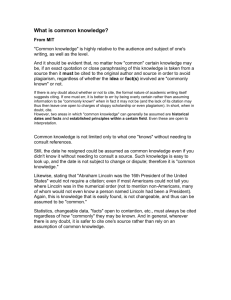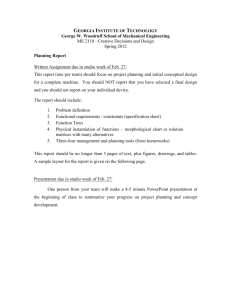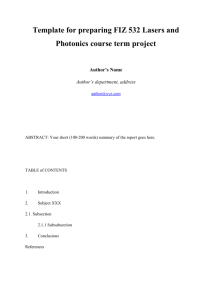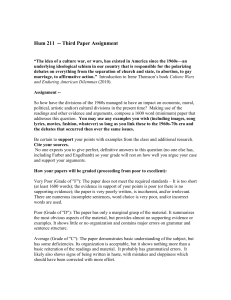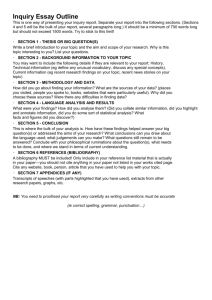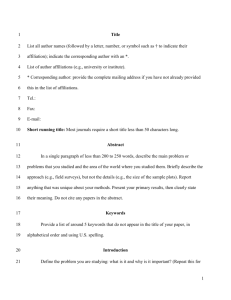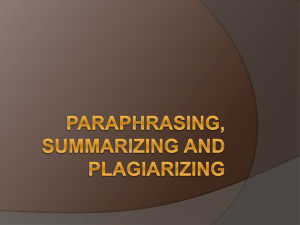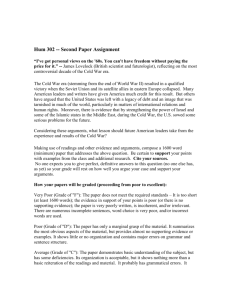Word version. - King`s College
advertisement
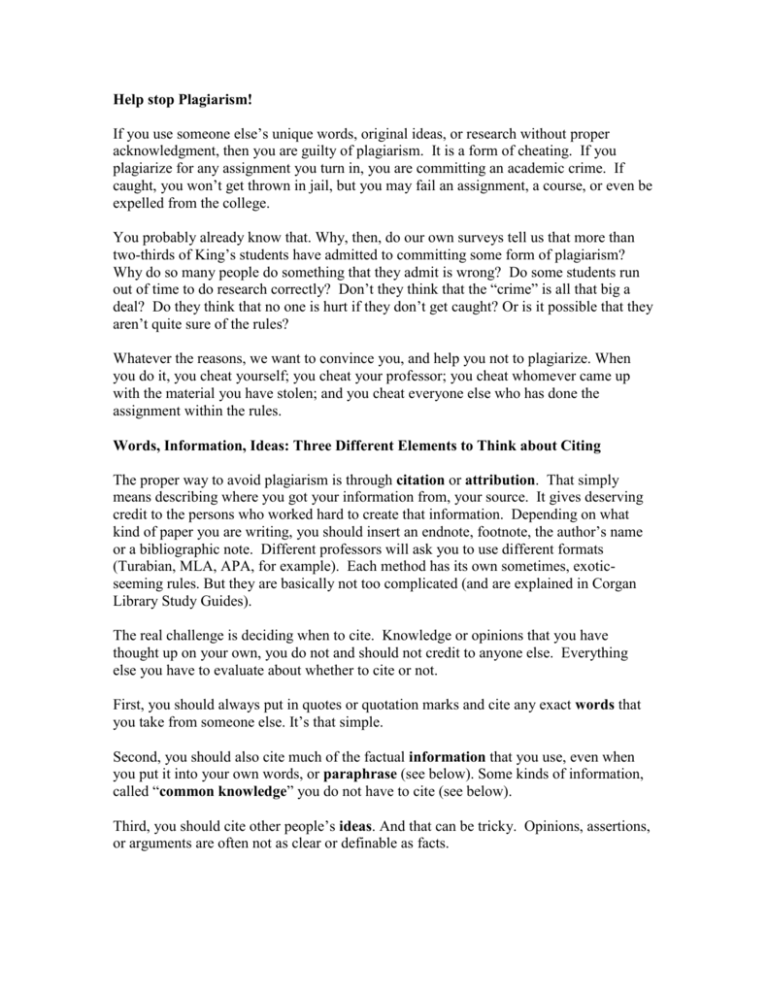
Help stop Plagiarism! If you use someone else’s unique words, original ideas, or research without proper acknowledgment, then you are guilty of plagiarism. It is a form of cheating. If you plagiarize for any assignment you turn in, you are committing an academic crime. If caught, you won’t get thrown in jail, but you may fail an assignment, a course, or even be expelled from the college. You probably already know that. Why, then, do our own surveys tell us that more than two-thirds of King’s students have admitted to committing some form of plagiarism? Why do so many people do something that they admit is wrong? Do some students run out of time to do research correctly? Don’t they think that the “crime” is all that big a deal? Do they think that no one is hurt if they don’t get caught? Or is it possible that they aren’t quite sure of the rules? Whatever the reasons, we want to convince you, and help you not to plagiarize. When you do it, you cheat yourself; you cheat your professor; you cheat whomever came up with the material you have stolen; and you cheat everyone else who has done the assignment within the rules. Words, Information, Ideas: Three Different Elements to Think about Citing The proper way to avoid plagiarism is through citation or attribution. That simply means describing where you got your information from, your source. It gives deserving credit to the persons who worked hard to create that information. Depending on what kind of paper you are writing, you should insert an endnote, footnote, the author’s name or a bibliographic note. Different professors will ask you to use different formats (Turabian, MLA, APA, for example). Each method has its own sometimes, exoticseeming rules. But they are basically not too complicated (and are explained in Corgan Library Study Guides). The real challenge is deciding when to cite. Knowledge or opinions that you have thought up on your own, you do not and should not credit to anyone else. Everything else you have to evaluate about whether to cite or not. First, you should always put in quotes or quotation marks and cite any exact words that you take from someone else. It’s that simple. Second, you should also cite much of the factual information that you use, even when you put it into your own words, or paraphrase (see below). Some kinds of information, called “common knowledge” you do not have to cite (see below). Third, you should cite other people’s ideas. And that can be tricky. Opinions, assertions, or arguments are often not as clear or definable as facts. In the simplest form of citing ideas, describe who said or wrote something that has influenced your own thinking. If you’re writing about the shrinking ozone layer, and you read something by a scientist who points out that putting a true price tag on reducing ozone-destroying emissions should consider damage to tourism, agriculture, fishing, and other industries, then you should cite that scientist. He or she may be offering the argument as an opinion – as a scientist she can do that sort of thing. You can then work with it as a source for your argument, and you should cite it if you do. Sometimes, however, you reach a complicated idea and you can’t be certain which sources helped you get there. Good, original work – the kind of writing we encourage– often means drawing on a variety of sources. You may read something, forget most of it, and then find later that you have reconstructed it in your own head. If you are an honest writer and scholar, you’ll retrace your steps, reread the key things you used, and mention them somewhere in your argument. Other times you may find that someone else has already said the very argument you have written down. As frustrating as that may be, you should still acknowledge that new source. If you have to admit that someone else has reached your same conclusion, it doesn’t make the point any weaker, and it doesn’t mean that your work is less important. You still should cite that source. Common Knowledge You don’t have to cite “common knowledge” because it is something “everyone” knows, or should know. It is like being in the public domain. Anything that isn’t “common” is something that you have to cite. In general, common knowledge falls into obvious and inarguable facts: the Declaration of Independence was first signed in July of 1776; Wilkes-Barre is the only hyphenated city name in the state of Pennsylvania; or the mascot for the Wilkes-Barre/Scranton Red Barons is named “Grump.” It is a good rule of thumb that if you can find it in numerous sources or a standard encyclopedia like Britannica or Americana, it’s common knowledge. Be careful, though, more specialized encyclopedias, such as The Encyclopedia of Philosophy or Encyclopedia Judaica feature articles by specific scholars and you should cite their ideas and information if you use it. Also, it’s true that most information in most high school textbooks is common knowledge. It’s trickier with college textbooks, however. Some of them consolidate common knowledge and digest it for you, some present summaries of leading thinkers in the field, and some are full-length arguments by leading thinkers in their own right. (If you’re confused about which kind of text you have, ask your professor.) Be especially careful about information from the internet. The web provides lots of good information, and much of it is common knowledge. The internet is also full of unsupported opinions and just plain nonsense. Make sure your information comes from a reputable site, and cite it with as much data as you can (not just the URL link or address). And, of course, resist the temptation to just copy and paste words from websites. That is plagiarism. Finally, sometimes the only way to know whether something is common knowledge or not is to ask around, especially your professor. Paraphrasing Rewriting something into your own words, paraphrasing, does not exempt you from citation. You must always put everything you do not quote into your own words. Yet, changing a word or two from your source material does not make it your own. Good writing habits mean changing that other author’s words as much as possible, to make them your own. Have them sound like they came from you. You are developing a style or authorial “voice.” Use it. It shows you understand the original author (whom you must cite). Citation Depends on Context The question of citation gets especially complicated when you consider that “common” depends on the particular community you are part of. People outside of academe often are not required to cite as much as people within colleges and universities. Or, one group of scholars will know certain things in common, while another might find some of the same information foreign. In an English class, for example, if the question of psychological repression comes up, you may need to cite Sigmund Freud as the originator of the concept. He wrote about it extensively, and he popularized the idea about a century ago. In a psychology class, however, your professor might take Freud’s work as common knowledge, and she might instead ask you to cite a variety of contemporary thinkers who build off of his theories. In two different cases, you treat the same material differently. As difficult as that sounds (and is), working it out is a key part of getting a liberal arts education. Being educated isn’t just about knowing things; it’s also about knowing where your ideas and information come from. You’ll know your own ideas and your own mind more clearly when you have a fuller sense of the sources from which you are learning and arguing. What Should You Do? Here are some suggestions for avoiding plagiarism: Do the right thing. If you know that someone else said or thought it before you did, then find some way to acknowledge that. Trust your conscience. Always cite other people’s quoted or paraphrased words. Cite ideas, not just words. Try not to wait until the last minute. You can clear up most confusing questions with a timely question in class. If you wait, though, you’re much more likely to run into problems. When in doubt, cite. Very few faculty complain about too many citations (although that can be a problem), but almost all of us have had problems with plagiarism. Pay attention to your professor’s instructions about an assignment. Most instructors are very specific about the kind of sources wanted for a paper and how to cite them (e.g. MLA, APA, Turabian, also explained in Corgan Library Study Guides). Use your sources while you write your essay. If you find yourself ‘finished’ with the essay and then saying, “I need to find a couple of sources,” then you’re writing backwards. Use a variety and diversity of sources in your paper. Too much reliance on one source can make your paper seem copied. Trust your own words. Many students say that they plagiarize, in part, because they want to sound more impressive. Don’t make that mistake. Your own argument in your own words is more impressive than anything plagiarized. Use the Writing Center. It’s free (you’ve already paid for it in your tuition), and trained students are there, ready to help with your papers. When in doubt, ask the professor who gave you the assignment. Check into further information about plagiarism at <www.kings.edu/infoliteracy/plagiarism.html>. Title: Help stop Plagiarism! Author: The Information Literacy Project Team Publisher: King’s College Location: Wilkes-Barre, Pennsylvania Date: 2003
